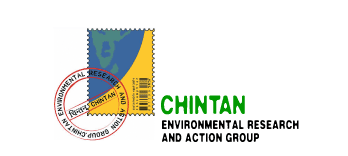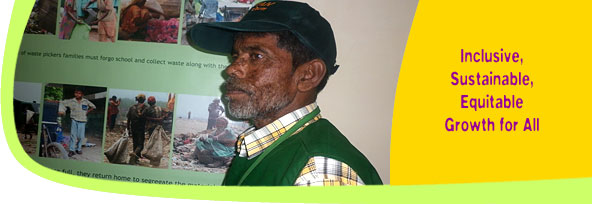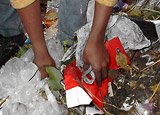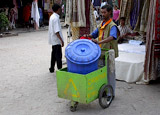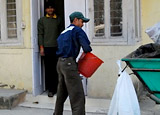|
|
|
FEEL FREE to download and use materials or information
on this website. Just let us know when
and where you are using it! |
Scavengers to ManagersEvery day, millions of people across India earn a living by working in trash—this includes over 1.5 million wastepickers, as well as itinerant buyers, small and large waste traders, workers in these godowns and reprocessors. Their work involves picking waste, segregating it, cleaning it, dismantling it, transporting it and trading in it. They are effectively the primary recycling system in India and help keep the environment cleaner than it would otherwise be. But the work of the recyclers themselves is far from being a green job, and very far from being secure. While they offer invaluable services to the city, recyclers have few rights and operate in uncertain and poor working conditions. Every day, they are exposed to deadly poisons, are forced to pay bribes simply to do their job, are harassed and suffer violation of their basic rights. Chintan addresses this by helping build green businesses at the bottom of the pyramid, chiefly among wastepickers. Our understanding of green jobs in the Indian context builds on the widespread international understanding. We define a green job as one that not only results in environmentally sustainable goods and services, but also one that enables a worker to earn minimum wages, work safely and legally and not be exposed to toxins. Some examples of this are doorstep waste collection, composting, primary treatment of PET plastics, and safely dismantling complex electronic waste (e-waste). What Chintan DoesSolid Waste
Electronic WasteE-waste is part of our everyday vocabulary now. It means old computers, televisions, mobile phones and anything else electronic that can't be used anymore. India generated 3.3 lakh tonnes of e-waste in 2007 and the figure has likely touched 4.7 lakh tonnes in 2011. India not only produces e-waste but, incredibly, also imports it from the US, Malaysia and other countries. E-waste comprises some highly toxic chemicals. Just one computer may contain hundreds of such chemicals, including lead, mercury, cadmium, brominated flame retardants (BFRs) and polyvinyl chloride (PVC). Many of these are known to cause cancer, respiratory illness and reproductive problems. These chemicals are especially dangerous because they migrate into the soil, water and air, and accumulate in our bodies. Approximately 95% of this waste is dismantled, reused and recycled by a highly specialized informal sector. Those who work in this sector face severe hardship, know the dangers of their work and do it because most of them have the skills but are poor and find this a way to earn. The companies whose obsolete products they recycle are indifferent to their living and working conditions. These companies are, in fact, responsible for a highly exploitative system of recycling. Read this blog on the Huffington Post to get the picture. Chintan seeks to improve post-consumer e-waste handling by advocating
for better policies, organizing and building the capacity of e-waste
handlers for green jobs, and by telling the story constantly to engage
the larger public. What We Have Done on E-wasteChintan worked with e-waste dismantlers for over 3 years to set up an association, 4R, in January 2009. It now helps 4R when required so that it may set up a dismantling factory and create a replicable model. In May 2010, the Ministry of Environment and Forests (MOEF) released the Draft E-waste (Management and Handling) Rules, 2010. Our work on the ground led us to believe that these draft rules would not serve the purpose of handling e-waste safely. In fact, the rules would be impossible to implement and would only result in job loss. Chintan advocated for more inclusive policies that were reflected in the rules issued in May 2011. See our blog post here. |
Search
|
